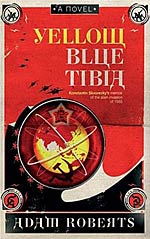
![]() charlesdee
charlesdee
7/7/2013
![]()
In 1946, Joseph Stalin assembles a group of leading Soviet science fiction authors in a remote dacha. Since Stalin assumes that the American empire will collapse within the next five years, he knows the Soviet people will need a new enemy. He charges these writers with the commission to create a tale of alien invasion that will galvanize and unite the citizenry. The writers set to work, both enjoying the luxury of the surroundings and knowing that at any moment some whim of the government might decide they are better off dead. Just as they complete the final touches of the their tale of "radiation aliens" who begin their assault by destroying part of the Ukraine, a government official announces that their services are no longer required. They are sent home, and lose contact with one another. Some die, some are imprisoned, others simply disappear.
Robert's novel is the first person account of Konstantin Skvorecky, one of those original writers. Upon his return to Moscow, he abandons writing and ekes out a meagre living as an English translator. This allows ample time for his alcoholism, which comes to an end only after he accidently sets his vodka-soaked beard on fire. The story picks up again in 1986. Skvorecky is 69 years old, with predictably bad lungs from a lifetime of smoking, burn scars that stretch his chin into an awkward grimace, and a patch on his nose that is the result of sloppy Soviet plastic surgery and frequently causes strangers to tell him he has a bit of tissue stuck to his face.
In one day he is sent to translate for a pair of visiting Scientologists looking to establish a base of operations in the USSR. He is runs into one of his old sf buddies that he thought dead and who now works for a lowly government agency and yet has a bodyguard the size of a large bear. He might as well be wearing a KGB gimme cap. A taxi that is to take him home instead delivers him to a clandestine meeting of UFO enthusiasts where he turns out to be a star attraction. One of the Scientologists is there. He wants to -- needs to -- talk to Skvorecky. Something about that novel they were writing forty years ago. It is all coming true. This conversation is interrupted when a bright light from overhear paralyzes them, and the American Scientologist is lifted into the air, dropped to the ground, and killed. Skvorecky is in deep, Soviet shit.
Robert's is writing broad satire, peopled with bumbling yet lethal Soviet officials, an irritating cab driver with OCD, car chases, narrow escapes, plots to explode a nuclear reactor, and a narrator who can be at times either sympathetic and irritating. Some reader reviews fault this book for historical inaccuracies, but Robert's is writing broad satire and for the most part pulling it off. (Too many contemporary writers have a research fetish and don't know how to set up and pull off a joke.) I was willing to accept our physically decrepit hero's ability to escape several death attempts by either guile or that surprising well of stamina we all hope we would have when confronted by a KGB assassin. Skvorecky even finds true love, and we get a last minute lesson in quantum physics that actually does a good job of tying the plot together. While reading and enjoying the book, a coherent resolution was the last thing I would have expected.
http://www.potatoweather.blogspot.com